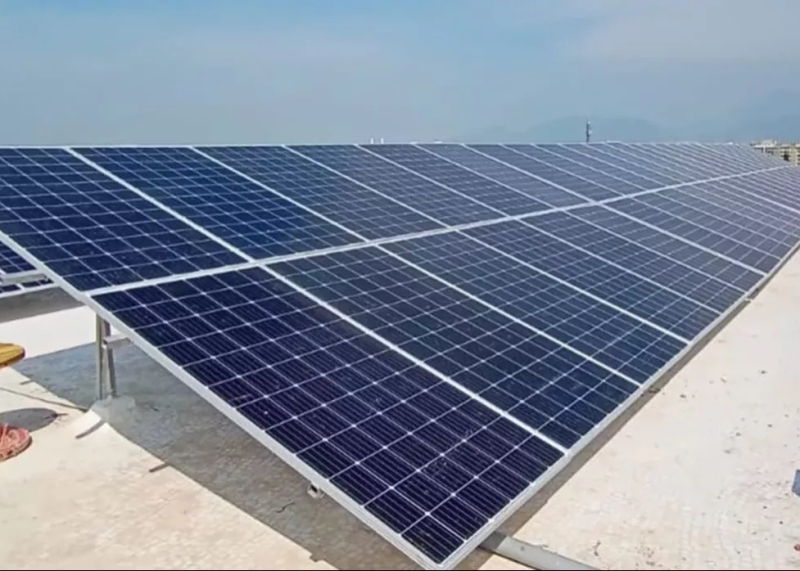- Israeli Aggression against Qatar, Extension of Crimes against Palestine |
- No place is safe in Gaza. No one is safe |
- Stocks fail to recover despite slight gains in Dhaka, Ctg |
- BB Purchases $353m in Dollar Auction to Stabilise Taka |
- Promoting social inclusion of disabled persons thru empowerment |
3,000MW National rooftop solar program overly ambitious: IEEFA

Rooftop solar panels on a building in Dhaka City.
The US-based Institute for Energy Economics and Financial Analysis in a briefing note released on Monday called Bangladesh government’s target to install 3,000-MW solar capacity in public buildings’ rooftops by the end of this year overly ambitious.
The Bangladesh Power Development Board announced the rooftop solar project on July 7.
Bangladesh has been battling an acute energy crisis for years.
This is the second rooftop solar initiative introduced in the country. The first initiative required new buildings to have rooftop solar to get connected to the national power grid.
Many of those rooftop solar installments ended up becoming stranded assets, leaving banks and other financial institutions with a negative impression on rooftop solar, creating a major financing challenge, the note said.
The combined power demand in government offices, hospitals, educational and religious institutions is 1,500MW, half the target, said the IEEFA briefing note.
“The Sustainable and Renewable Energy Development Authority should assess and document rooftop solar potential in these buildings,” Shafiqul Alam, IEEFA’s lead energy analyst for Bangladesh and the author of the note, was quoted in a media release issued on the occasion of releasing the briefing note.
“Furthermore, fund allocations for various projects, tendering, evaluation of bidding documents, issuing work orders and project implementation will likely require an extension of the December 2025 deadline,” said Shafiq.
The note stated that achieving new rooftop solar capacity of 3,000MW in less than six months implies scaling up installations to more than 12 times the capacity of 245MW built so far until June 2025.
The note highlighted that only 15-20 high-quality Engineering, Procurement and Construction companies operate in the country, and they may not have enough capacity to install 3,000MW in less than six months.
Under Bangladesh’s new rooftop solar programme, government offices will roll out installations via the CAPEX model supported by public funds, while hospitals and educational institutions will operate under the OPEX model with no upfront cost, said the press release.
Poor coordination, lack of maintenance, and rushed developer selection stand in the way of implementing the government’s rooftop solar plan under the CAPEX model.
On the other hand, the OPEX model ensures quality, but offers lower savings, and could face financing hurdles and risks from load-shedding in rural areas.
“If projects are small and scattered in rural areas, they may fail to attract companies to invest in the OPEX model,” said Shafiq.
The note also underscored that utilities should find a way to address load-shedding in rural areas.
The advice is for Bangladesh to draw on the experience of its neighbouring countries like India, Pakistan and Sri Lanka, which boast of a greater share of renewable energy in the power mix, ranging from 47% to 63%.
For instance, Pakistan’s rooftop solar sector success is an example that push factors, such as energy supply crunch and unaffordable power tariffs, can spearhead change.
In Sri Lanka, the government addressed financing barriers to expand rooftop solar, supported by a multilateral agency, the note said. Later, the government provided funds for rooftop solar on public buildings.
Similarly, India’s rooftop solar capacity of more than 18 gigawatts in May 2025 can be attributed to the consistent policy and regulatory support extended by the government.
China wants to invest in solar panels manufacturing; deepen ties with Bangladesh
Shafiq also called for establishing an independent monitoring mechanism to ensure the implementation of the government’s rooftop solar programme. - UNB

